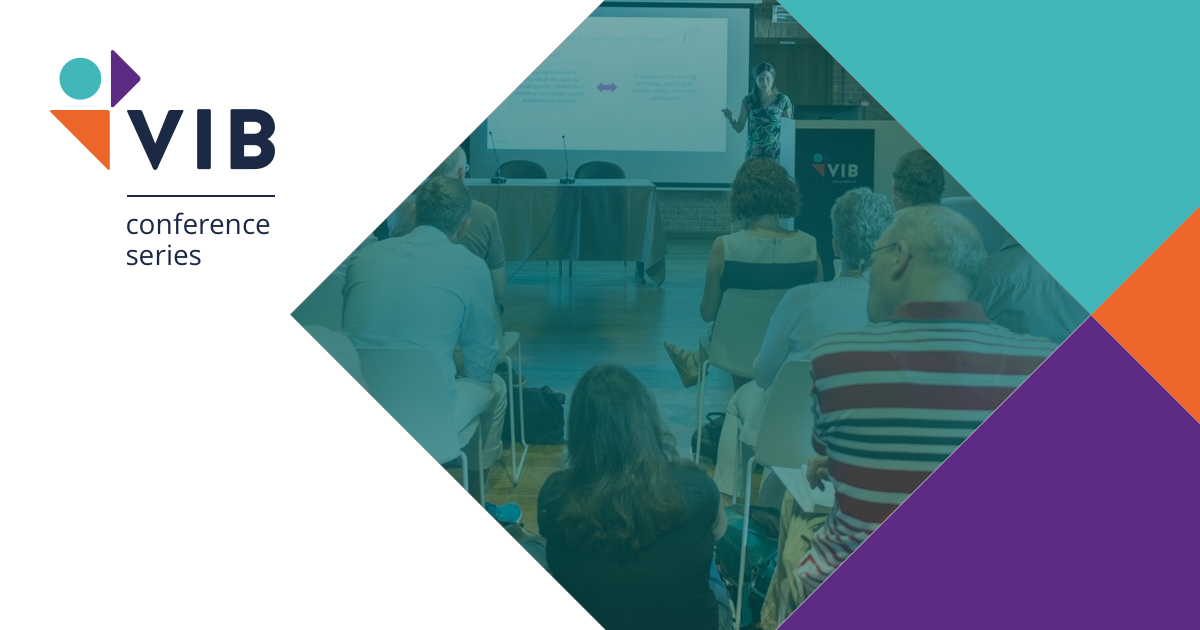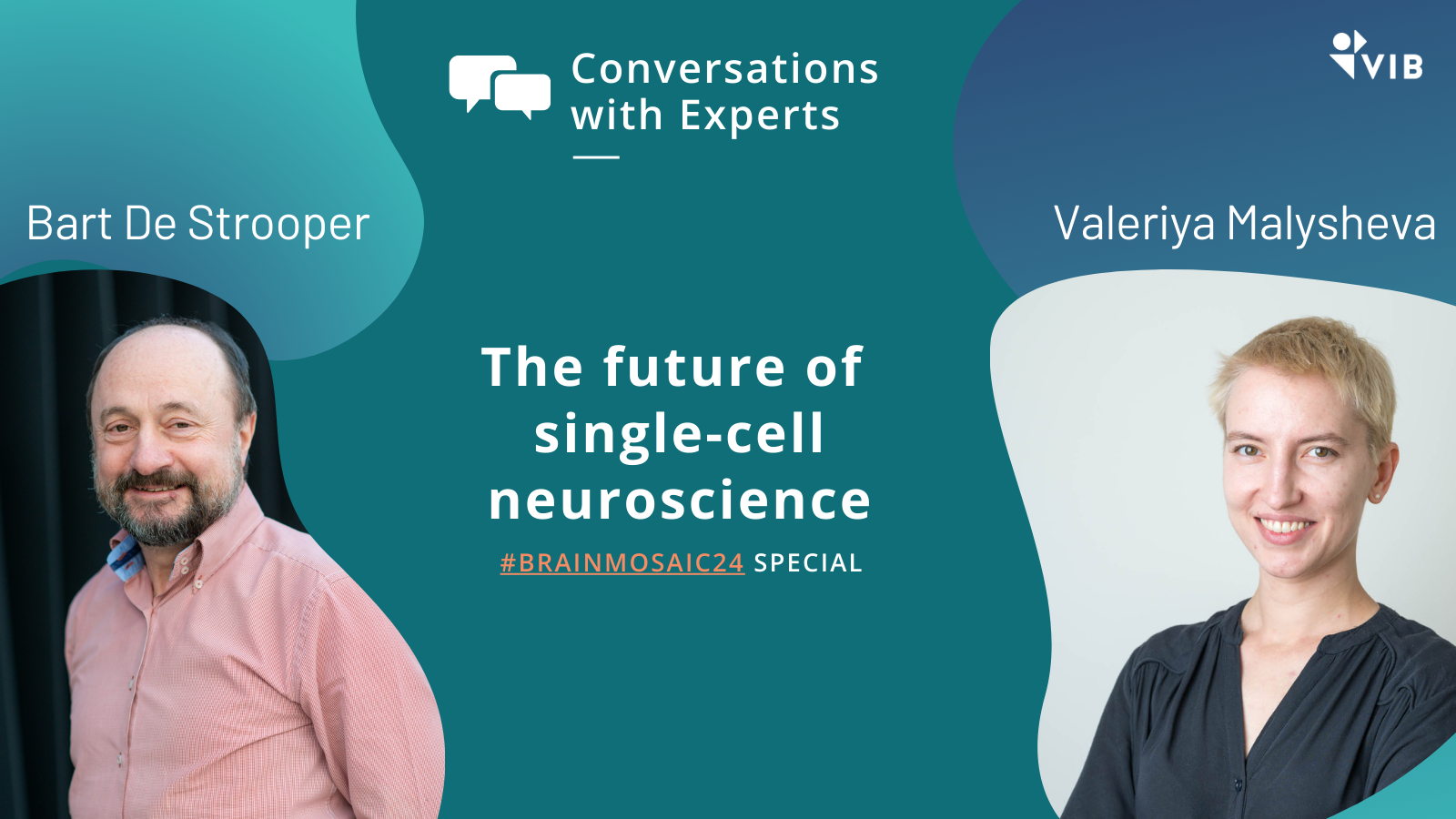Conversations with experts: the next frontier of single-cell neuroscience
For the third edition of The Brain Mosaic, we sat down with two members of the organizing committee who are leading voices in the field of single-cell neuroscience. The first is Prof. Bart De Strooper, who leads the lab for the research of neurodegenerative disease at the VIB-KU Leuven Center for Brain & Disease Research. He goes into conversation with Prof. Valeriya Malysheva, who heads the Computational Neurobiology lab at the VIB-UAntwerp Center for Molecular Neurology. Their work dives deep into the mysteries of the brain at the cellular level, and they are united by their shared enthusiasm for the future of the field—though they also offer a word of caution. Here’s what they had to say about their research, the evolution of the field, and the next big breakthroughs.
Hi both, please tell us in your own words about your current work in single-cell neuroscience.
Bart: “In my lab, we're trying to untangle the puzzle that is Alzheimer's disease. Every neuron and cell in the brain plays a unique role, but until recently, our understanding of these elements was very basic. It was like looking at a map with no details. The single-cell revolution has changed that. Now, we can study cells in their precise locations within the brain. A recent example is that we used single-cell sequencing to track gene expression at the level of individual microglia, the brain's resident immune cells, to see how they react in different stages of the disease. This has opened up new avenues for understanding Alzheimer’s, such as revealing potential therapeutic targets that were invisible to us before”
Valeriya: “This is an incredibly exciting time, given the burst of single-cell technologies and advances in computational approaches! In my lab, we're leveraging these techniques to understand the regulatory mechanisms behind normal and aberrant cellular decision-making — why cells behave the way they do. To piece together this complex picture, we use machine learning to analyze multimodal data, reconstruct (cis)-regulatory networks, and pinpoint the key triggers and factors governing cellular decisions in health and disease.”
Bart, you set up this conference topic, “The Brain Mosaic”, back in 2016. How have you seen the field evolve since then?
Bart: “It's been like an explosion! When we started, there were only a few proof-of-concept studies. Now, we're flooded with data—it’s almost overwhelming. The real challenge is to make sense of it all. The half-life of innovation in our field is about six months; by the time you finish one experiment, new methods or datasets have already emerged. I find it more exciting to focus on disease-specific questions and figure out what really matters in all this data. It’s a challenge, but that’s what makes it thrilling.”
Valeriya: “Absolutely! The data boom is real, but the real question is indeed how to find meaningful patterns and causal relationships amidst all the noise. It’s not just about crunching numbers, though. You do need to have a deep understanding of the biological processes behind it. The advances in computational methods and statistics are hugely helping biologists to discover the diamonds hidden in all that data.”

Is this also where the next breakthrough in the field will lie?
Valeriya: “Indeed! I think the next breakthrough will be in the field of causal AI. With causal AI algorithms, we will be able to build models describing complex cause-and-effect relationships, understand system behavior under some crazy perturbation scenarios, and identify what data is missing and what experiment we need to do next to decrease the uncertainty in our conclusions. It’s going to immensely advance our capabilities and transform the way we understand the data and build the world.”
Bart: “I completely agree. Over the next ten years, integrating big data analysis with hypothesis refinement will become the norm. You create a computer model, make a prediction, and then go back to the lab to test if that prediction holds. This feedback loop—refining models based on real-world lab results—will drive the next wave of discoveries.”
In 50 years, where do you see all of this leading?
Bart: “It’s exciting and a bit frightening. I imagine a massive computer in the heart of human civilization that knows everything, predicts everything, and models every aspect of human biology. Maybe it will even start asking its own questions. AI could help solve some of our biggest problems, from diseases to environmental issues. Especially with the brain, I’m hopeful we will really understand how the brain works and what goes wrong during neurological diseases. But we must be careful not to trust machines too much—we risk losing our critical thinking skills. Hopefully, we can use AI to continue further advancing human civilization. Human beings are currently shaping their own evolution, becoming less bound by nature's limitations and more masters of our own fate. But with that power comes the risk of self-destruction.”
Valeriya: “I think I’m more optimistic. I’m hopeful we’ll maintain more control than we fear. AI can already generate its own questions, but we need to remain conscious of what we’re creating. I genuinely believe many diseases will be cured, and this could happen much sooner than we expect.”
If you weren't a scientist, what path might you have taken?
Valeriya: “As a child, I wanted to be either a magician or a mathematician. Somehow, I ended up a computational biologist. I wish I had time to be a musician and a philosopher! Sometimes, I feel like I have a thousand-year plan for all the different lives I’d like to live! [laughs]”
Bart: “I love music too and might have pursued it more seriously. But there was never really any question about my career path—I’ve always loved science. Scientists are my people; we think alike, and we have fun together. Now that I’m less involved in administrative duties, I’m enjoying the best years of my life. Being a father is probably the only role that is more important.”
What's the best advice you ever received?
Bart: “My own advice: don’t ask for too much advice! Follow your own instincts, learn by doing, and focus on what you love.”
Valeriya: “I agree. At the same time I learned a lot and was encouraged by example from my supervisors and colleagues. Never stop learning, stay curious, and keep pushing forward.”
And lastly, what’s your favorite book at the moment?
Bart: “I don’t read as many books these days; I’ve discovered watching Netflix instead! I love Breaking Bad—it’s like a novel with amazing character development.”
Valeriya: “I’m a bit of an erratic reader. Right now, I’m juggling The Second Sex by Simone de Beauvoir, In Search of Lost Time by Marcel Proust, and The Book of Why by Judea Pearl.”
Thank you both! Looking forward to seeing you at the conference.

India Jane Wise
.png)




